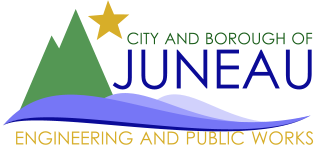
6. Juneau Voices: Walter Soboleff, Jr.


Alaska becomes a state. Racial tensions mount. The Vietnam War breaks out. Walter comes of age through it all, in the sunshine and shadow of his father, a famous Alaska Native leader.
More about this story
-
Juneau Voices #6 is located at Seward Street and Front Street.
-
Walter Soboleff, Sr., Ḵaajaaḵwtí, a Tlingit man from Killisnoo Island near Angoon, was ordained as a Presbyterian minister and served as pastor of Juneau’s Memorial Presbyterian Church for 22 years. When the United Presbyterian Church in the United States of America (UPCUSA) mandated the closure of the Memorial Church in 1962, Soboleff became an itinerant pastor. Throughout the state, he was highly regarded as an important advocate for Alaska Natives.
-
To spend more time with Walter Soboleff, Jr, please visit: https://www.aanyatxu.org/walter-soboleff-jr
-
The narrators for Juneau Voices are David Katzeek, Kingeisti, an Eagle, and Erin Tripp, Xáalnook, a Raven.
WALTER SOBOLEFF JR.
NARRATOR 1:
Raven has led us here to Juneau Voices number 6– the intersection of Seward Street and Front Street.
NARRATOR 2:
Take a look across the street here. There’s Eagle, standing proud on the cedar beams of the Sealaska Heritage Institute.
NARRATOR 1:
The Walter Soboleff Building.
NARRATOR 2:
Dr. Walter Soboleff: a great leader from the village of Killisnoo. A beloved orator across the state. Walter Soboleff died in 2011.
WALTER:
And Walter Soboleff… is my father.
NARRATOR 2:
This is Walter Soboleff, Junior.
SOUND: Eagle’s call and a musical phrase send us back in time.
NARRATOR 1:
1957
NARRATOR 2:
1957
WALTER:
I’m 7 years old. My father is the founding pastor of the Juneau Memorial Presbteryian Church. This Church votes to open its membership to everyone. And it’s packed!
Native and non-Native worship together, in the Jim Crow Era in Alaska. Tlingit elders call the church X̱usx̱atáayi. They can’t pronounce “Presbyterian.”
WALTER:
My father’s sermons are powerful. When other ministers speak, they’re just completing a task. But Dad preaches to me, from his heart. He tells a story:
DAVID (as Walter Soboleff, Sr.):
“On your way home from this church, pick up a pebble. Hold it in your hand. It’s cold at first, but give it warmth and it will slowly change.”
WALTER:
He’s talking about love. Embrace someone cold, and love will gently warm them.
NARRATOR 2:
1959
NARRATOR 1:
1959
SOUND: Drumming and singing.
WALTER:
I’m 9 years old. My father takes me to Thunderbird House. Just me and my dad. We paint my face with dark whiskers on each cheek. It’s Haida paint, honoring my mother’s side, Genevieve Ross Soboleff. Sometimes I wear paint to honor my Tlingit side— three lines like the ribs of a dog salmon. My father is a GOOD dancer! He can get lower than anyone. For a brief, special moment, I have his attention.
SOUND: The drumming ends.
WALTER:
Being a kid in Juneau is lonely. I get teased and pushed around. Some bullies are white kids… And I’m Native. Other bullies are Native…. And I’m a Soboleff. My family is too successful. At home, our doors are always open to people who need shelter. My dad says to us,
NARRATOR 1 (as Walter Soboleff, Sr):
“I have a flock to watch over.”
WALTER:
One night, my father hears that a family in the Douglas Village has lost their home to fire.
NARRATOR 2:
That’s right across the water over there.
WALTER:
He takes our dinner right out of the oven, and drives to Douglas to give it away! Dad is always available to Juneau—but he’s not always available to me. It’s hard having a father who’s a national monument.
NARRATOR 1:
1979
NARRATOR 2:
1979
WALTER:
I fight in the Vietnam War. I lose so many of my friends and I lose so much of my innocence. I return to Juneau. And my father’s church… is gone. The big bosses of the Presbyterian Church shut it down. My father becomes an itinerant pastor—
NARRATOR 1:
Visiting villages, canneries, and lighthouses–
NARRATOR 2:
But social and racial relations in Juneau are scarred.
WALTER:
And my father’s heart is broken.
NARRATOR 2:
1999
NARRATOR 1:
1999
WALTER:
I am driving with my dad, on Glacier Highway. We’re talking:
NARRATOR 2:
About the war…
NARRATOR 1:
About the closure of the Memorial Church…
NARRATOR 2:
About the bullying and the loneliness.
WALTER:
My dad tells me…:
NARRATOR 1 (as Walter Soboleff, Sr.):
“I’m sorry, son.”
WALTER:
He doesn’t use those two words, but I know what he is saying. …All I ever wished was that my father would be there for me. Instead, he left our family name imprinted all over southeast Alaska.
NARRATOR 1:
And this building right here across the street.
WALTER:
I call this building…. Dad’s House. Ax̱ Éesh Hít. I know that my dad did his best for me.
When I tell him my hard memories, he says,
NARRATOR 1 (as Walter Soboleff, Sr):
“It’s good to go there. But don’t stay there too long.”
WALTER:
It’s good to go there but don’t stay too long. …I tell my tough stories so that I can heal, and so I know I’m not alone.
SOUND: Eagle’s call and a musical phrase bring us back to the present.
NARRATOR 1:
Eagle is lifting off from the cedar beams.
NARRATOR 2:
Flying down this narrow street here, South Seward Street, toward the water. We’re going to walk that direction, to Juneau Voices Number 7. It’s on the corner of the busy road there–that’s Marine Way.

